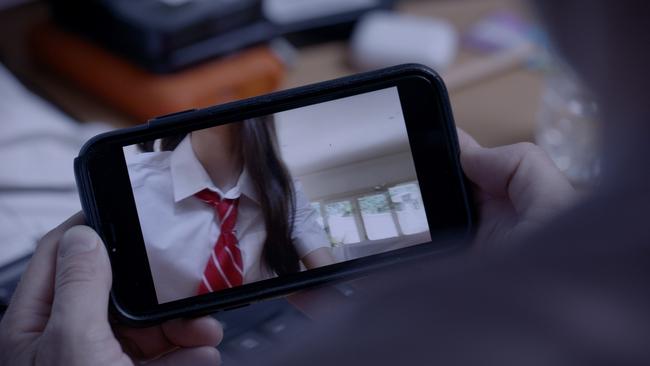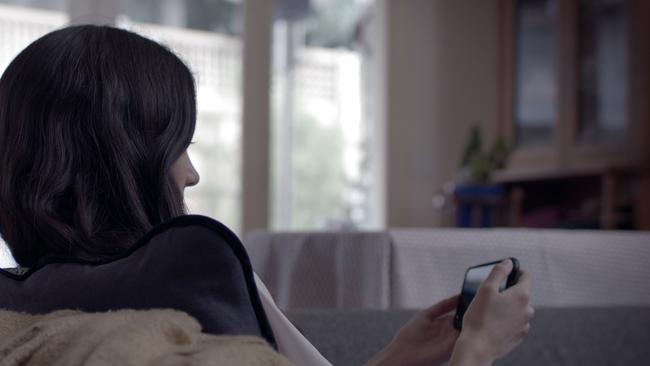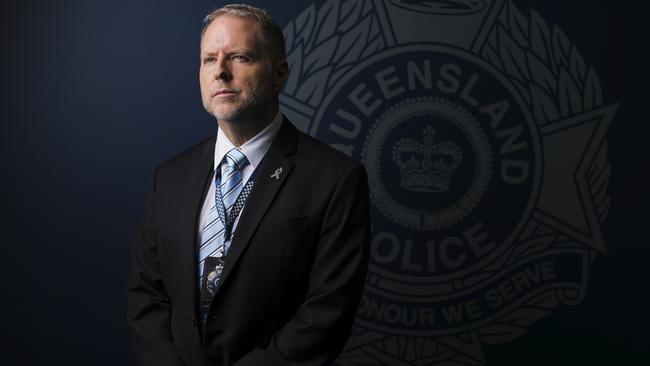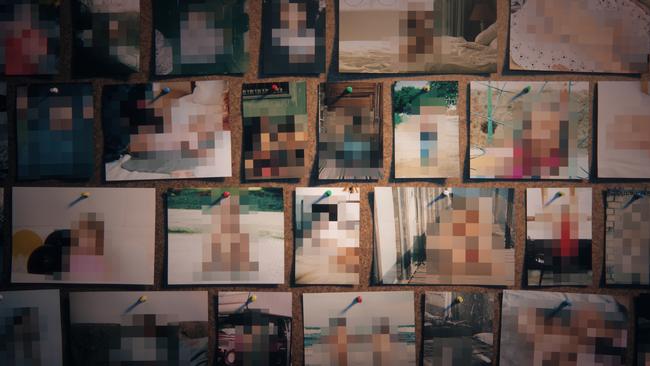Children in the Pictures documentary goes inside Queensland’s Task Force Argos
The numbers of children being groomed and blackmailed online has exploded, and a move by one social media giant could make it even harder for police to expose predators.
Police & Courts
Don't miss out on the headlines from Police & Courts. Followed categories will be added to My News.
A 12-year-old girl stands in her bedroom, a camera streaming her image into the home of a predator, and cries as she waits for the text commands to show on her screen.
She is a victim of “capping”, part of a global scourge now accounting for the majority of work for child exploitation investigators struggling to manage the number of children being groomed and blackmailed online.
“You’re looking at the offender’s view from the Skype capture … she’s probably about 12 and it opens up with her in what’s clearly her bedroom and she’s crying as it starts,” world-renowned Queensland investigator Detective Inspector Jon Rouse said. “And then it’s just text commands. You can see the text commands from the child sex offender on Skype … and she knows what she’s going to be subjected to for 37 minutes and it’s brutal.”

It’s one of the issues addressed in a documentary six years in the making, The Children in the Pictures, a film Insp Rouse hopes will spread awareness of an issue people would rather ignore.
The film, which will screen on SBS on October 24, details the phenomenal work of Queensland’s Task Force Argos and the Australian Centre to Counter Child Exploitation in shutting down global paedophile networks.
“People don’t want to hear about this,” Insp Rouse, operations manager at ACCE, said. “If you think your child has not been inappropriately approached online, you’re … kidding yourself.”
Insp Rouse uses the 37-minute clip of the crying girl as a training and education tool.
“I’ve seen some horrendous things … kids getting killed and all sorts of things. To sit through that is really hard. You are looking at this kid in her house and she is just devastated,” he said.

Children, he said, are now being forced to rape themselves on camera for predators who no longer need physical access to their victims in order to produce exploitation material.
Instead, they might pose as another child and “spam” children and their friends until they get a response.
From there, they groom their victims and perhaps convince them to send a naked photograph that they then use as a blackmail tool.
And it’s happening right now, all over Queensland.
“Your child might come out from their bedroom, you think they’re doing their homework, and they’re crying, and you’ll start thinking, they’ve had a fight with a friend,” Insp Rouse said.
“But you’ve got no idea what’s just happened. And they’re not comfortable talking about it, clearly.”

Insp Rouse said “self-generated content” – photographs or footage made by child victims under coercion from predators – accounted for 60 to 70 per cent of the material analysed by his victim identification team.
He said in 2001, when Task Force Argos was first established, the only material they saw was created by an offender who had managed to get access to a child – often a relative – and had filmed themselves abusing them.
“We’ve still got that going on, and should that not be our primary focus? These children are being raped,” he said.
“These children (online) are raping themselves – it’s equally concerning. “Horrendously damaging. It needs a law enforcement response, but we are stretched.”

He called on parents to pay more attention to what their kids are doing online, saying their children’s privacy was less important than the threat of them being targeted by a predator.
“That’s the thing that concerns me most, that you’ve got this generation that are throwing themselves at child sex offenders and then paying horrendous consequences for it without people even knowing it’s going on,” Insp Rouse said.
“That’s probably our biggest, for me anyway, our biggest challenge.”
He said social media platforms and app creators were taking no responsibility for the danger children faced.
Facebook’s plans to encrypt its messaging service would be a disaster, with law enforcement predicting they would lose 60 to 80 per cent of their cyber tips, he said.
“That’s 157 (alleged victim) children, nearly 1000 charges that came from one cyber tip – and look at that (alleged) threat that was removed,” Insp Rouse said.
“(Social media platforms) are making billions of dollars out of this technology with no care or regard or responsibility.
“And then when you get threatened to take some responsibility, OK, well, we’ll encrypt it.
“We’ll just turn off any visibility on what’s happening on our platform and that will make it go away. That’s not a solution.”

Directors Akhim Dev and Simon Nasht, who created The Children in the Pictures, said they had to fight hard to create a film about a topic the public found incredibly unpalatable.
“The film really is … the beginning of a kind of, let’s have a grown up conversation about this,” Nasht said.
“We’ve got to get over the horror thing and we’ve got to actually start thinking about ways around it.
“The frustration for Jon Rouse and his colleagues around the world is that there are solutions, there are ways of dealing with this.”
The Children in the Pictures, a documentary on the work of Queensland’s Task Force Argos and the Australian Centre to Counter Child Exploitation, will screen on Monday at Paddington’s Cinebar Cinema and on SBS on October 24.


